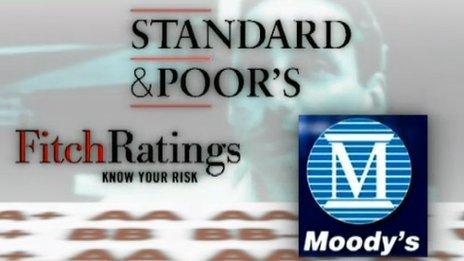Scottish independence: credit where it's due
- Published

Fitch is one of the three big ratings agencies, along with Standard & Poor's and Moody's
What credit rating would Scotland have if were independent, with John Swinney going to the money markets to borrow for investment in all those shovel-ready projects?
One answer came today from Fitch, one of the three big ratings agencies, and it was: it's impossible to say.
Even for a company that spends immense resource on measuring risk, the US company cannot measure it in Scotland's case.
It's published an analyst's note, aimed more at those with an interest in the UK's future credit rating.
This says the rating would depend on the terms of an independence agreement, and how long it takes for the transition to take place. That's as well as uncertainty on splitting assets and liabilities, and the question over Scotland's future financial regulation.
Doubt and reassurance
Does this matter? Who's going to cast their vote on the basis of Scotland's credit rating?
Well, it matters in that a credit rating is necessary if the bond markets are to consider buying an independent Scotland's bonds.
If Scotland starts with a rating below AAA, which is likely given that it has, obviously, no credit history, that will mean higher borrowing costs than a country, such as the UK, which has the treasured triple-A.
And if the Scottish government has to spend more to service debts, that's a higher share of government expenditure.
You could argue that if Scotland's still using sterling, which the SNP wants to do, surely it will still have interest rates set by the Bank of England's monetary policy committee?
That doesn't follow if you look at the eurozone. Yes, a base rate is set by the European Central Bank, but for the past five years, there has been wide divergence between eurozone borrowing rates, as the markets' measure of the risk of default.
The Fitch note also matters more directly in the independence debate.
As explained by BBC Scotland's political editor Brian Taylor, the battle can be seen as pitching pro-union campaigners sowing seeds of doubt, against the pro-independence side seeking to reassure. Fitch's analysis, in short, is a lot more about doubt than reassurance.
Trade deficit
It does, however, offer some reassurance for the rest of the UK, saying that it ought to keep its triple-A rating in the event of Scotland going its own way.
It weighs up the loss of oil revenue, and says that would be offset, roughly, by the Treasury in London having to spend less on Scottish services.
"This, and the fact that UK oil revenue is forecast to decline in any case, would make the budgetary impact marginal," says the note.
It goes on to say there would be a negative impact on the balance of trade, as England, Wales and Northern Ireland would have to boost imports of oil, rising to 2% of gross domestic product.
But it also says, without citing any evidence, that Scotland currently has a bigger trade deficit with countries outside the UK. So if that's true and if that larger deficit were removed, it might mitigate against the impact of the loss of domestically-produced oil.
And while Fitch says the rest of the UK would keep its triple-A rating intact, it adds that the problems in the UK economy put it on negative watch - that is, at risk of a downgrade.
You can comment or follow Douglas Fraser on Twitter: @BBCDouglsFraser